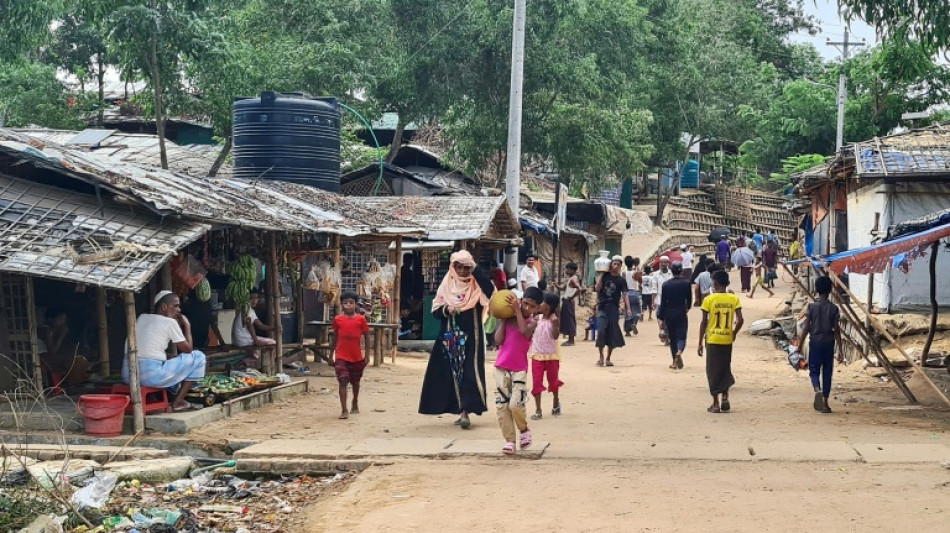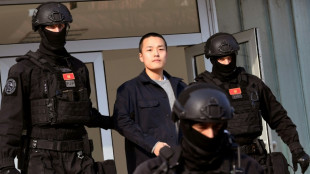

Fleeing Myanmar, Rohingya refugees recall horror of war
They clung on through years of conflict in Myanmar but a surge of fighting has driven tens of thousands more Rohingya to flee, escaping with little more than harrowing tales of war.
"I saw countless dead bodies," said 50-year-old refugee Hasina, recounting her traumatic journey to neighbouring Bangladesh.
She has joined around a million members from her stateless and persecuted Muslim minority, who have already been eking out an existence in sprawling refugee camps in Cox's Bazar in Bangladesh since escaping violence in 2017.
Fighting has battered Myanmar's Rakhine state since Arakan Army (AA) rebels attacked the junta's security forces in November 2023.
When AA forces -- ethnic guerrillas wanting their own territory -- seized Maungdaw district in early December, Hasina fled.
A shell landed just outside her home killing her neighbours, including two children.
"After the bombing, the Arakan Army stormed my house and took everything I had," Hasina said, who asked to use only one name, fearful of being identified.
"I am a widow and childless, but there wasn't even enough food to feed a single mouth in my house".
The United Nations has warned of the risk of famine in Rakhine.
- 'Intense and incessant' -
Myanmar has been in turmoil since a military coup in February 2021.
But the Rohingya endured decades of discrimination in Myanmar, where successive governments classified them as illegal immigrants.
Yet many Rohingya remained until the escalation of fighting this year created a new surge of refugees.
"The battle spread from village to village... The bombing was so intense and incessant that the ground trembled for days," said Mohammad Yasin, a Rohingya boatman, who had reached the Teknaf port in Bangladesh.
"Many people were killed."
Bangladesh's leader Muhammad Yunus, who is heading the interim government, estimates some 80,000 Rohingya have arrived in Bangladesh in the latest fighting, without giving an exact timeframe.
Abu Bakkar is among them, arriving in Cox's Bazar in early December.
Bakkar, from a village in Maungdaw, said his wife was killed during his escape to Bangladesh on a terrifying journey where "the bombing didn't stop".
He described, like other refugees, seeing AA rebels seize young Rohingya men to fight for them but, as an older man, he managed to escape -- paying an "exorbitant fare" for a boat to Bangladesh.
"The Arakan Army arrived and took young Rohingya men from the villages," Bakkar said.
"Some managed to escape -- I came to Bangladesh with a few of them."
The Arakan Army has repeatedly denied accusations of targeting Rohingya civilians and of forcible recruitment.
Junta forces have also been accused of forcing young men to fight which, like the rebels, they deny.
AA forces said on Friday they had captured a military regional command at Ann, a huge blow to the military.
- 'Increasing the destitution' -
Conditions in the already overcrowded refugee camps in Bangladesh are dire.
Shams Ud Douza, from Bangladesh's Office of Refugee Relief and Repatriation, said people from other communities have also fled to Bangladesh, including the Buddhist Chakma, Rakhine and Tanchangya.
"The overcrowded refugee camps in Cox's Bazar, already struggling to accommodate those from previous exoduses, are now overwhelmed with new arrivals," said Moshor Rof, from the CRRIC-Rohingya Response rights group in Cox's Bazar.
Mir Mosharaf Hossain, a UN refugee agency official in Cox's Bazar, said most new arrivals fled "with very few belongings" and require basic supplies, heaping pressure on their relatives.
"As the violence in Rakhine state in Myanmar continues to escalate, Rohingya... have been sharing accommodation, food and other essentials with the new arrivals, increasing the destitution of the overall population," Hossain said.
A.Fischer--MP




